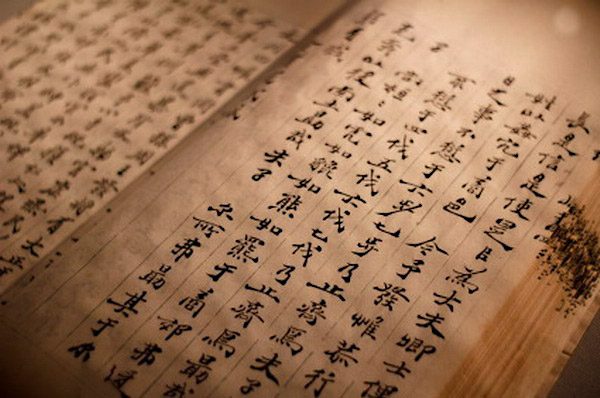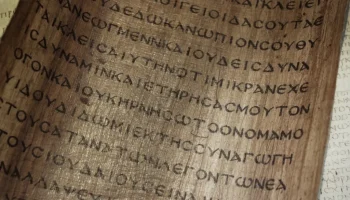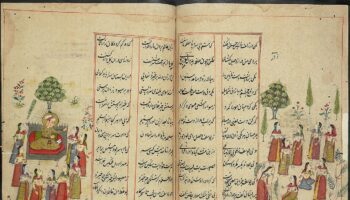The first great period of Chinese literature came during the Zhou dynasty, which ruled from about 1045 to 221 BCE. The Book of Songs (also known as Classic of Poetry) collects approximately 300 poems whose authors are mostly unknown. These lyric poems focus on a range of subjects including love, friendship, children, sacrifice, war, and admiration for the dynastic rulers. For many years, it was suggested that Confucius compiled an edition of The Book of Songs but no evidence proves his involvement. The poems speak simply yet directly, reflecting the concerns of the people at that time. In a poem celebrating the Duke of Zhou, the speaker proclaims:
Broken were our axes
And chipped our hatchets.
But since the Duke of [Z]hou came to the East
Throughout the kingdoms all is well.
He has shown compassion to us people,
He has greatly helped us.
(de Grazia 40; song 232, lines 1–6)
This poem’s simplicity strengthens its message of appreciation, and such a straightforward approach characterizes poems addressing other subjects. In a poem about serving the king during wartime, the speaker tells of his difficulties:
Now that we are on the march again
Snow falls upon the mire.
The king’s service brings many hardships.
We have no time to rest or bide.
We do indeed long to return.
(de Grazia 43; song 132, lines 27–31)
Although speaking respectfully of the king, the poem presents the struggles of a soldier—the physical work, the challenges of weather, and the longing for home. The Book of Songs demonstrates both the personal and social concerns of people from this era while also displaying delicacy and artistry in writing.
The classical Chinese era also witnessed the birth of major sacred and philosophical works. The I Ching, also known as Book of Changes (c. 1000–200 BCE), is a book of divination and philosophy compiling sixty-four hexagrams for divining the future. The book’s readers, traditionally using plant stalks or similar items, distribute them according to detailed guidelines. Based on a complex system of determination, users are directed to specific hexagrams, which enlighten them to particular understandings of their meaning. In one configuration of the Sun Hexagram (hexagram 41), the interpretation suggests that “if there be sincerity (in him who employs it), there will be great good fortune:—freedom from error; firmness and correctness that can be maintained; and advantage in every movement that shall be made” (146–47). This oracle was used during the classical era as a guide for decision-making. Although the I Ching functions more as a code book than traditional literature, its interest in signs influenced philosophies such as Taoism, which advocates opening oneself up to the world to be guided along the path that is offered.
The Analects of Confucius, the central document of the philosophical movement Confucianism, was written by Confucius’s followers, most likely during the century following his death in 479 BCE. The Analects collects sayings, anecdotes, and other brief texts explaining Confucius’s beliefs about ethical conduct. Confucius advocated an orderly society, encouraging respect for parents and elders. Although some think of Confucianism as a religion, it is more a code of behavior for maintaining a humane, ethical society. Confucius’s writings stress the necessity of civility and modesty with phrasings pithy yet dense, such as in his musings over one’s personal failings: “The Master said: ‘Your faults define you. From your very faults one can know your quality’” (4.7). He also expounds on one’s potential propensity to conceit: “The Master said: ‘Clever talk and affected manners are seldom signs of goodness’” (1.3). These examples emphasize the importance of self-reflection and respectfulness, and, taken together, the maxims of the Analects offer a comprehensive guide to ethical behavior.
Tao Te Ching (c. sixth to fourth century BCE), the best-known work of Taoist philosophy, is a compilation of philosophical poems pondering numerous themes important in Taoism. Lao Tzu (also spelled Lao Tsu) is credited as the author, although nothing definitive is known about his life. The term Tao Te Ching translates into “the Book (ching) of the Way (tao) and the Power (tê)” (de Grazia 247). The Way of Taoism outlines the path of nature that allows one to live simply and reflectively. Taoists emphasize the value of passivity—letting oneself be guided by silence and nature rather than forcing one’s life through artificial steps—as expressed in poem 48:
In the pursuit of learning, every day something is acquired.
In pursuit of Tao, every day something is dropped.
Less and less is done
Until non-action is achieved.
When nothing is done, nothing is left undone.
The world is ruled by letting things take their course.
It cannot be ruled by interfering.
(Lao Tsu 50)
In addition to the virtue of non-action, the Tao Te Ching advocates in poem 67 the three treasures—mercy, economy, and humility—that serve as the core values of Taoism (69). Building the foundational principles of Confucianism and Taoism, the Analects of Confucius and the Tao Te Ching, along with the I Ching, continue to inspire countless people to reflect on the goals of earthly existence, through literature elegantly mixing simplicity with profundity.






